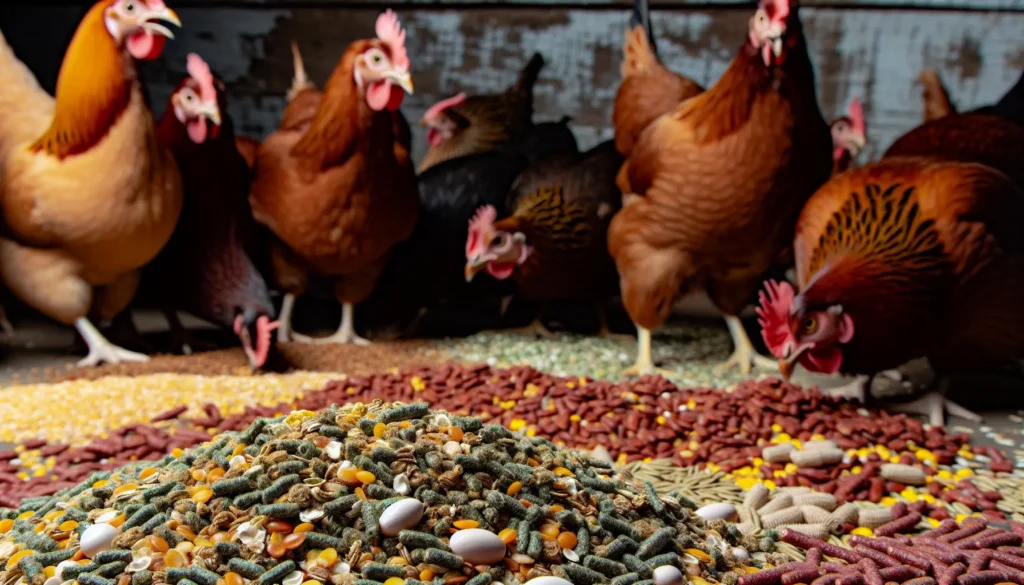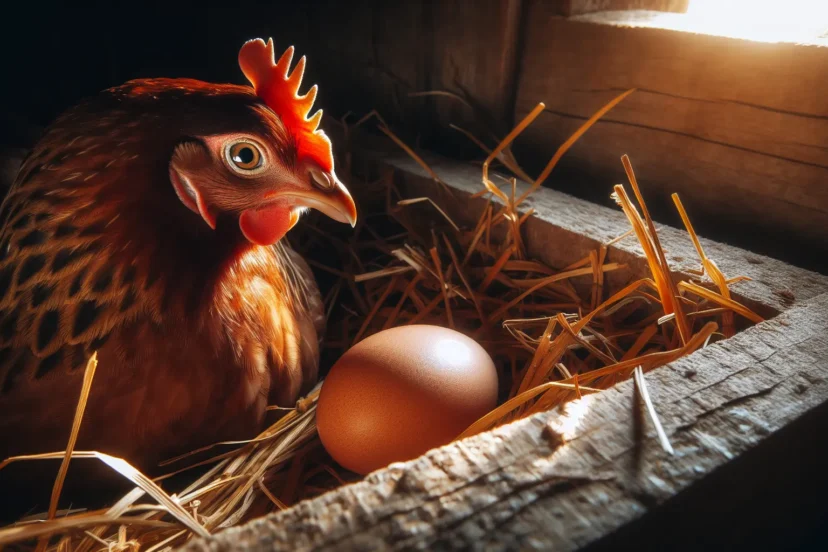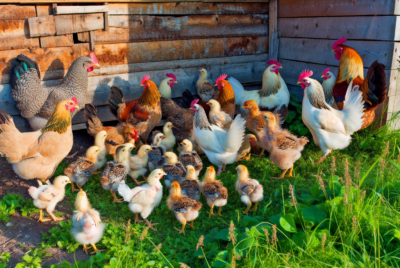How to Stop Chickens From Eating Eggs: Effective Strategies
Struggling with your chickens eating eggs? Our article cuts straight to the chase, providing actionable strategies that will help you stop this behavior. In the following sections, you’ll find targeted advice on nutrition, coop adjustments, and behavioral techniques to end egg eating.
Ready to protect your egg supply? Dive into our guide on how to stop chickens from eating eggs and reclaim control of your coop.
Why Hens Eating Their Eggs?
When a hen is low on nutrients, particularly protein or calcium, she might eat her eggs to compensate. A shortage of these essential nutrients can turn even the most well-behaved hen into an egg eater.
Accidental egg breakage in the nest can also trigger egg eating. Suppose a hen pecks at a broken egg out of curiosity and develops a liking for the taste. In that case, it can lead to other chickens eating eggs, as they mimic the behavior in the flock.
Identifying these triggers forms the initial step in stopping chickens from eating eggs. Some common triggers to watch out for include:
- Broken eggs in the nest
- Lack of proper nutrition
- Overcrowding in the coop
- Boredom or lack of stimulation
By addressing these triggers and implementing appropriate solutions, you can help prevent egg-eating behavior in your flock.
Immediate Actions to Curb Egg Eating
After identifying the root cause of the egg-eating problem, immediate action can halt this habit. Regular egg collection plays a significant role in preventing egg eating. It’s recommended to collect eggs at least once a day, ideally before 10:00 a.m., to stop the chickens from getting into the habit of eating their raw eggs.
In addition to frequent egg collection, it may be necessary to take the following steps to address egg-eating behavior in hens:
- Separate the egg-eating hens from the rest of the flock. This isolation not only prevents the egg eater from accessing eggs but also gives them a chance to unlearn their egg-eating habit.
- Provide a nutritious diet to ensure the hens get all the necessary nutrients.
- Create a stress-free environment for the hens, as stress can contribute to egg-eating behavior.
Optimizing the Nest Box Environment
Perfecting Nest Box Comfort

Comfortable nesting areas can do wonders in preventing egg breakage, a common trigger for egg eating. Providing a generous nesting material, such as pine shavings, straw, or hemp, can ensure a cozy hen nest. The recommended size for a chicken nest box is 12 inches x 12 inches x 12 inches, and it should be placed lower than the roosts at about 18 inches off the ground.

RentACoop 2-Liter Heated Poultry Waterer! Great cold weather solution to keep your flocks drinking fresh water year-round!
Note that chickens can conveniently share a nest box. I recommend:
- Having one nesting box per five chickens
- Regular cleaning to ensure the nest box remains a comfortable and attractive spot for the hens
- Switching out the nest box material every 2-3 weeks to keep the space clean and inviting.
Reducing Visibility with Nest Box Modifications
Reducing the visibility of the nest box can deter hens from eating eggs by making the eggs less obvious to them. This can be achieved by using curtains or adding a lid or cover to create a darker and more private space for the hens. This added privacy not only makes the hens feel more secure but it also protects the eggs from accidental breakage and subsequent egg eating.
Curtains can be made from various materials like:
- burlap
- vinyl
- cotton
- empty feed sacks
Ensuring that the curtains are a bit taller than the nest box opening effectively blocks the view. Other modifications, such as adding more nesting materials, making a specific entrance hole, and adjusting the roof overhang, can also reduce visibility in nest boxes. When hens find it harder to see the eggs, they are less likely to peck at or eat them.
Regulating Access to Nest Boxes
Regulating access to nest boxes adds another layer of protection against egg eating. Using roll-out trays or flaps in the nest boxes can significantly reduce the chances of hens eating their own eggs. When a hen lays an egg in a roll-out nest box, the egg rolls down a slope and into a covered tray, making it difficult for the hen to access and eat the egg.
Flaps, especially those made of dark fabric, cover the entry/exit hole for the hens. This keeps the nests dark and helps reduce egg eating. By regulating access to nest boxes, we can ensure that the hens lay their eggs in a secure environment, which significantly reduces the chances of egg eating.
Read also: Step-By-Step Guide on Building a Predator-Proof Chicken Nesting Box
Dietary Adjustments to Stop Egg Eating
Just like humans, hens can also develop certain habits due to dietary deficiencies. Adjusting your chickens’ diet can help stop egg-eating by ensuring adequate protein, calcium, and proper digestion.
Ensuring Adequate Protein and Calcium

A balanced diet is key to maintaining a healthy backyard flock. Hens require a diet with at least 16% protein and 3% calcium content to meet their dietary needs and prevent egg-eating behavior. Some protein-rich foods that can provide the necessary nutrients for the hens are:
- Animal by-products
- Canola
- Field peas
- Flax
- Lupins
- Soybeans
- Sunflower seeds
- Soy-free poultry diets
Calcium plays a pivotal role in egg production. It is essential for creating strong eggshells and preventing egg breakage. Hens require around 4-5 grams of calcium daily for eggshell formation. By ensuring that your hens have access to a balanced diet, you can prevent egg eating due to nutritional deficiencies. Some good sources of calcium for hens include:
- Crushed oyster shells
- Ground limestone
- Eggshells (crushed and baked)
- Calcium supplements
Providing these calcium sources will help ensure that your hens have the necessary nutrients for healthy egg production.
The Role of Grit in Digestion
Apart from protein and calcium, grit is another crucial component of a hen’s diet. Grit aids digestion by grinding down food in the gizzard, making it easier for the hens to digest and absorb nutrients. Good digestion ensures that hens get all the necessary nutrients and prevents them from developing an egg-eating habit.
Types of grit beneficial for hens include oyster shell grit, which provides the necessary calcium for solid eggshells, and flint grit, which aids in grinding down food. Hens should have constant access to grit for optimal health, with each hen typically consuming between 1/6 and 1/3 pounds of grit per month.
Treats and Snacks: Do’s and Don’ts
Snacks and treats can serve as a great source of entertainment for hens. However, it’s important to ensure that they do not disrupt the balance of their diet. Treats should not exceed more than 5% of their diet, about two tablespoons per day.
Nutrient-packed snacks that can keep hens entertained and fulfill their nutritional needs include:
- Grubblies
- Black soldier fly grubs
- Milk
- Yogurt
- Sunflower seeds
By providing the right treats and snacks, you can prevent egg-eating while keeping your chickens happy and healthy.
Behavioral Interventions to Prevent Egg Eating
Apart from dietary adjustments and nesting box modifications, behavioral interventions can also prove effective in preventing egg eating. These interventions include decoy tactics, taste aversion methods, and enrichment activities.
Decoy Tactics with Dummy Eggs

One of the most commonly used behavioral interventions to prevent egg eating is decoy or dummy eggs. Dummy eggs, made with a hard eggshell-like exterior or even golf balls, placed in the nest boxes can discourage hens from eating their own eggs by mimicking the hardness of a real egg.
The fake eggs, also known as dummy eggs, are designed to be the same size, shape, and weight as real eggs, fooling the hens into believing they are real eggs. When a hen pecks at a dummy egg, she quickly learns that it is not edible and eventually stops trying to break open the real eggs. Keeping the dummy eggs in the nest boxes for about a month can effectively deter hens from eating eggs.
Taste Aversion Methods
If your hens are persistent egg eaters, taste aversion methods can be a useful deterrent. This method involves filling empty eggshells with unpleasant substances like mustard or soap. When a hen pecks at the filled eggshell and experiences the unpleasant taste, she associates this unpleasant taste with eggs and is discouraged from eating them in the future.
While taste aversion methods can be effective, it’s important to note that they could make hens feel queasy. However, there are no severe side effects, and the method has been found to effectively deter hens from eating eggs.
Enrichment Activities to Reduce Boredom
Boredom can be a significant trigger for egg eating in hens. Providing enrichment activities can keep hens entertained and reduce the likelihood of them eating their eggs. Exploring foraging material and perches can keep hens busy and relaxed.
Healthy snacks that can help prevent egg eating include eggs, black soldier fly grubs, milk, yogurt, and sunflower seeds.
These snacks not only provide hens with essential nutrients but also keep them entertained, further reducing the chances of egg eating. By providing these enrichment activities, you can keep your hens engaged and prevent egg-eating.
Advanced Solutions for Persistent Egg Eaters
Despite our best efforts, some laying hens may continue to eat their eggs. In such cases, we may need advanced solutions such as roll-out nesting boxes or selective culling.
Roll-Out Nesting Boxes
Roll-out nesting boxes are an excellent solution for persistent egg eaters. These boxes have a slanted surface that allows the eggs to roll down into a safe spot, like a cup or tray, preventing the hens from accessing them. This setup not only keeps the eggs clean but also reduces the chances of them getting broken.
To set up a roll-out nesting box, you need to:
- Create a slanted platform using boards and a 2×4 placed under the front to ensure the eggs roll into the collection area.
- Make sure the nest is dark and easy to access for egg collection.
- Ensure that larger hens don’t perch on the roll-away metal piece, which could lead to egg cracking.
Say goodbye to persistent egg eaters and keep your eggs safe and clean. Discover the benefits of roll-out nesting boxes today. Get the Homestead Essentials Nesting Box for your coop!
Selective Culling as a Last Resort
Selective culling, or removing the egg-eating hens from the flock, is a last resort for controlling persistent egg-eating behavior. While it might seem drastic, it can sometimes be the only solution to maintain a healthy and productive flock.
Selective culling requires careful consideration of ethical aspects, potential reduction in biodiversity, and the well-being of the remaining hens. It is advisable to consider this option only when other strategies have been unsuccessful or if the hens are aggressive and causing harm to other animals.
Frequently Asked Questions
Can Debeaking prevent egg eating?
Debeaking can prevent egg eating by preventing layers from pecking at their eggs, as well as before the start of lay to avoid egg and vent pecking. So yes, debeaking can help prevent egg eating among layers.
How do you increase calcium in chickens?
To increase chicken calcium, provide crushed oyster shells mixed with crushed eggshells in an easily accessible spot, and offer black soldier fly grubs as a daily snack for a balanced calcium and phosphorus intake. Try this and see the difference in your chickens’ health and egg production!
How do I stop chickens from eating their eggs?
To prevent chickens from eating their eggs, try adding ceramic or wooden eggs to the nesting box to discourage the behavior. Keep collecting the real eggs often to further deter them from pecking at the eggs. Additionally, provide enough nesting boxes and keep them clean to reduce the chances of floor nesting and egg eating.
Stop Your Chickens Eating Their Eggs With Chicken Raising 101
Overcoming the challenge of egg eating in chickens, especially your hens, requires a comprehensive understanding of the problem and a multifaceted approach to its solution. From understanding the reasons behind the behavior and taking immediate actions to dietary adjustments and behavioral interventions, each strategy plays a vital role in preventing egg eating.
The journey to curb egg eating might seem daunting, but with patience, persistence, and the right strategies, it is certainly achievable. Remember, every challenge is an opportunity to learn and grow; tackling egg eating is no exception.





